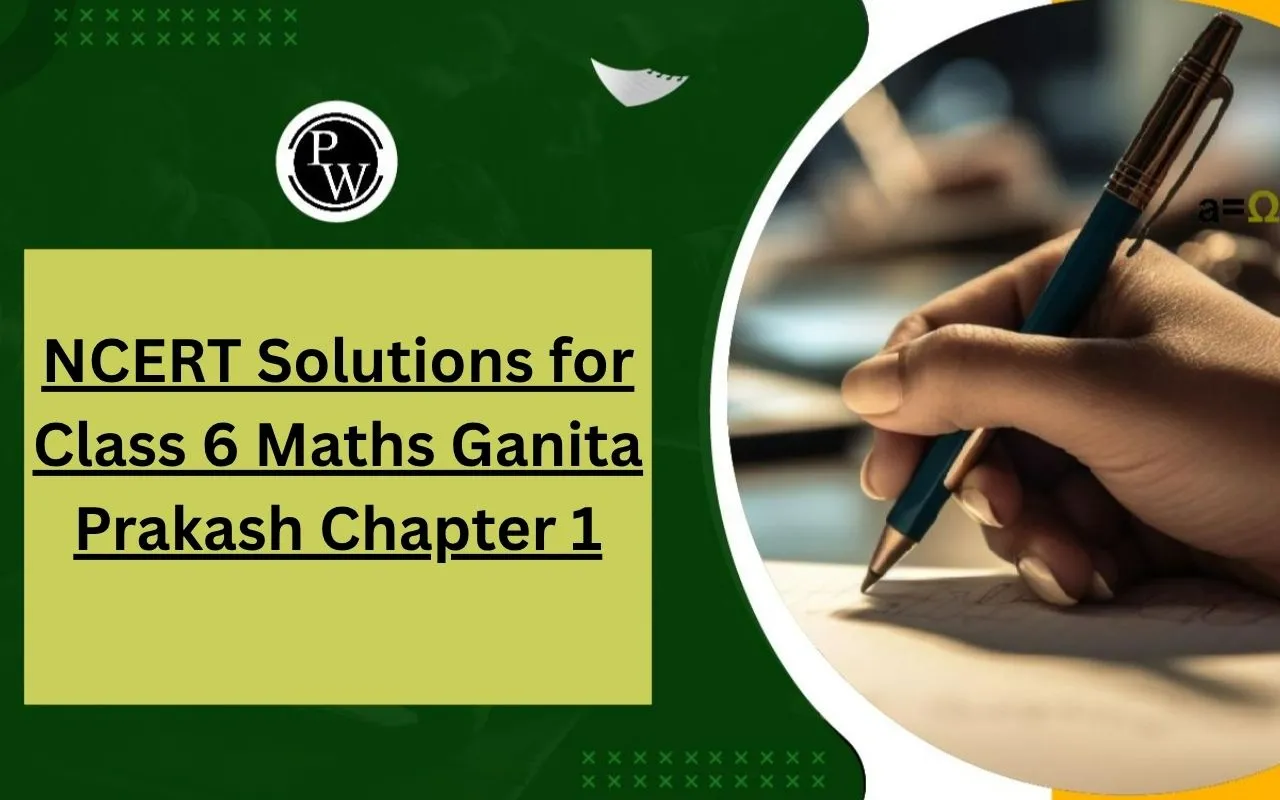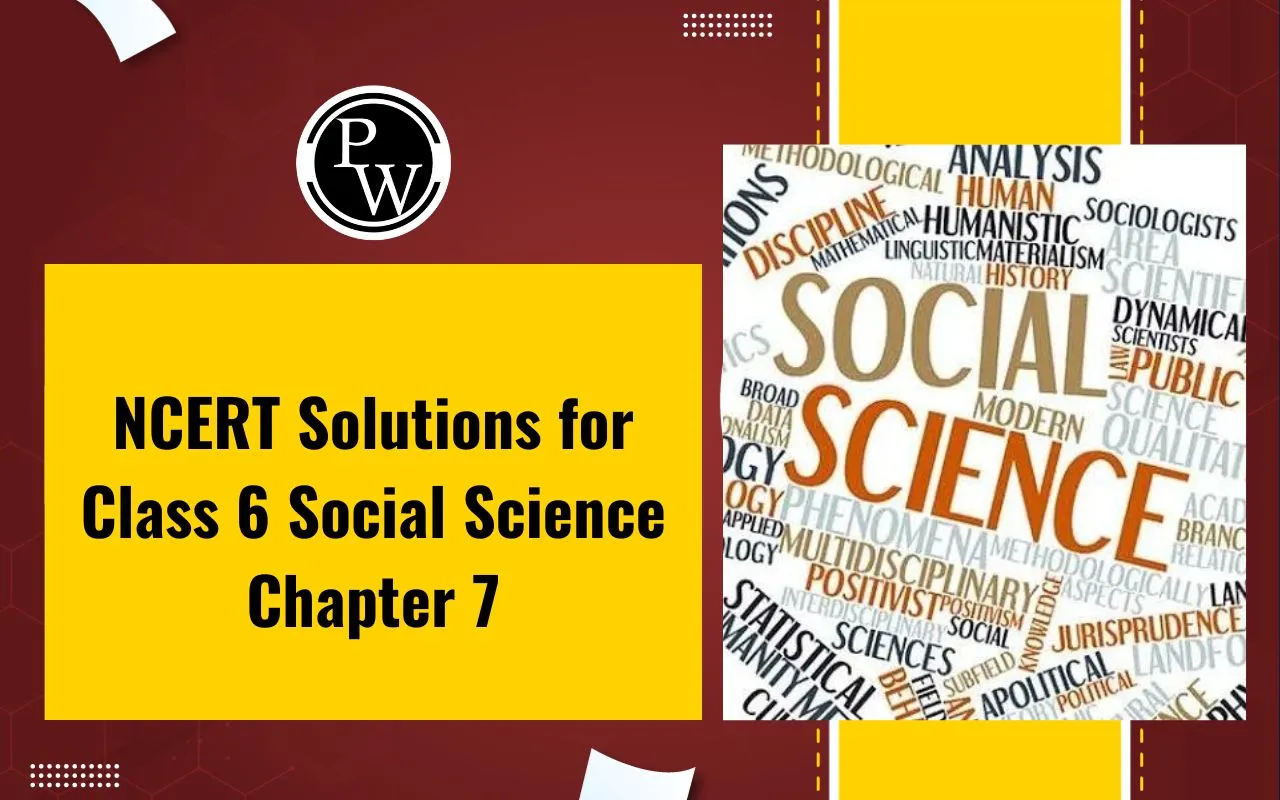
NCERT Solutions for Class 6 Social Science Civics Chapter 7
NCERT Solutions for Class 6 Social Science Civics Chapter 7 : In the rapidly advancing world, the options for online education have expanded, creating a challenge for students to identify a reliable platform. While there are numerous resources available for accessing NCERT Solutions, selecting the most trustworthy one becomes a crucial task. Access the NCERT Solutions for Class 6 Civics Chapter 7 - Urban Administration on Physics Wallah. These solutions, meticulously prepared by Physics Wallah, serve as an excellent resource for comprehending all the concepts effortlessly and efficiently. Designed with precision and conciseness, these solutions offer clarity, making it easy for you to grasp each answer. By utilizing these solutions, you can confidently aim for the desired marks in your exams. Find solutions to all the questions presented at the conclusion of Chapter 7 in the latest NCERT Book for Class 6 Civics. All these NCERT Solutions are readily available in a downloadable format for your convenience.NCERT Solutions for Class 6 Social Science Civics Chapter 7 Overview
Reside in a city? Ever wondered about the sources of water and electricity in your home or who takes care of the street lamps? Chapter 7 of CBSE Class 6 Civics delves into the realm of urban administration, crucial for providing fundamental amenities like street lights, garbage disposal, and water supply. Urban administration goes beyond, involving tasks such as tax collection (house and water taxes), managing the city's drainage system, and maintaining parks and markets. In India, municipal corporations or councils shoulder these responsibilities. The chapter elucidates the roles and duties of urban administration, ensuring the seamless functioning of the city. Additionally, you can explore NCERT Solutions for Class 6 Civics Chapter 7, "Urban Administration," which furnishes answers to exercises found in the 'Social and Political Life' book.
The chapter elucidates the roles and duties of urban administration, ensuring the seamless functioning of the city. Additionally, you can explore NCERT Solutions for Class 6 Civics Chapter 7, "Urban Administration," which furnishes answers to exercises found in the 'Social and Political Life' book.
| CBSE Syllabus Class 6 | |
| CBSE Class 6 Science Syllabus | CBSE Class 6 Maths Syllabus |
| CBSE Class 6 Social Science Syllabus | CBSE Class 6 English Syllabus |
NCERT Solutions for Class 6 Social Science Civics Chapter 7 Urban Administration
Here are the key topics covered in Chapter 7 - "Urban Administration" of Class 6 Social Science Civics:1) Introduction to Urban Administration:
- Understanding the concept of urban administration.
- Exploring the significance of urban administration in the context of city life.
2) Provision of Basic Amenities:
- Discussing the essential services provided by urban administration, such as street lights, garbage collection, and water supply.
- Recognizing the role of urban administration in enhancing the quality of life in cities.
3) Tax Collection:
- Explaining the process of tax collection by urban administration, including house and water taxes.
- Understanding how taxes contribute to funding various civic services.
4) Maintenance of City Infrastructure:
- Examining the responsibilities of urban administration in maintaining the city's drainage system.
- Understanding the role in managing public spaces like parks and markets.
5) Role of Municipal Corporations or Councils:
- Exploring the functions and duties of municipal corporations or councils in urban governance.
- Understanding how these bodies contribute to the overall development and well-being of the city.
6) Ensuring Smooth Functioning:
- Highlighting the efforts of urban administration in ensuring the smooth functioning of the city.
- Discussing the challenges and solutions in managing urban areas effectively.
7) Case Studies:
- Analyzing case studies to understand practical applications of urban administration.
- Drawing insights from real-life examples of successful urban governance.
CBSE Board Exam Centre List 2024
NCERT Solutions for Class 6 Social Science Civics Chapter 7 Important Questions
Q1: What is the role of urban administration in providing basic amenities in cities? Answer: Urban administration plays a crucial role in providing essential amenities such as street lights, garbage collection, and water supply in cities. It ensures the smooth functioning of these services to enhance the quality of urban life. Q2: How does tax collection contribute to urban administration? Answer: Tax collection, including house and water taxes, is a source of revenue for urban administration. These funds are essential for maintaining and improving civic services, infrastructure, and amenities in the city. Q3: Explain the responsibilities of urban administration in maintaining the city's drainage system. Answer: Urban administration is responsible for managing and maintaining the city's drainage system. This includes regular cleaning, repairs, and ensuring proper functioning to prevent waterlogging and flooding during heavy rains. Q4: What role do municipal corporations or councils play in urban governance? Answer: Municipal corporations or councils are key bodies in urban governance. They perform various functions such as urban planning, infrastructure development, waste management, and overall administration to ensure the well-being and progress of the city. Q5: How does urban administration contribute to the development of public spaces like parks and markets? Answer: Urban administration is involved in the planning, development, and maintenance of public spaces like parks and markets. It aims to create recreational areas, ensure cleanliness, and provide facilities for citizens to enhance the overall urban experience. Q6: Discuss the challenges faced by urban administration in managing cities effectively. Answer: Urban administration faces challenges such as population density, infrastructure demands, waste management, and environmental concerns. Balancing the needs of a growing urban population while maintaining sustainability is a constant challenge. Q7: Can you provide an example of a successful urban administration initiative in India? Answer: One notable example is the Swachh Bharat Abhiyan (Clean India Campaign), a nationwide cleanliness drive launched by the government. It involved urban administration efforts to promote cleanliness, waste management, and hygiene in cities. Q8: Explain the significance of street lights in urban areas. How does urban administration ensure their proper functioning? Answer: Street lights are crucial for safety and visibility in urban areas, especially during the night. Urban administration ensures their proper functioning by regular maintenance, prompt repairs, and efficient management of the electrical infrastructure. Q9: What are the major challenges faced by urban administration in waste management? Provide solutions to address these challenges. Answer: Urban administration faces challenges in waste management, such as increasing waste generation and inadequate disposal methods. Solutions may include promoting recycling, implementing waste segregation at the source, and adopting sustainable waste disposal practices. Q10: Discuss the role of citizens in supporting urban administration. How can citizens contribute to improving the urban environment? Answer: Citizens play a crucial role in supporting urban administration by following civic rules, participating in cleanliness drives, and reporting issues promptly. They can contribute by practicing waste segregation, conserving resources, and actively engaging in community initiatives. Q11: Explore the concept of urban planning and its importance in city development. How does urban administration contribute to effective urban planning? Answer: Urban planning involves organizing land use, infrastructure, and services in cities. Urban administration contributes by creating master plans, zoning regulations, and development projects to ensure sustainable and organized growth. Q12: Describe the role of municipal corporations in addressing environmental challenges in urban areas. Answer: Municipal corporations play a significant role in addressing environmental challenges by implementing policies for pollution control, green initiatives, and sustainable urban development. They work towards creating a healthier and eco-friendly urban environment. Q13: Explain the concept of 'Smart Cities' and how urban administration contributes to transforming cities into smart cities. Answer: 'Smart Cities' focus on leveraging technology for efficient urban services and enhanced quality of life. Urban administration contributes by integrating smart infrastructure, digital solutions, and innovative governance to create technologically advanced and sustainable urban areas. Q14: Discuss the impact of urbanization on the challenges faced by urban administration. How can these challenges be mitigated for sustainable urban development? Answer: Urbanization poses challenges such as congestion, resource demand, and environmental strain. Mitigation strategies may include urban planning reforms, investment in public transportation, and promoting eco-friendly practices to ensure sustainable urban development. These questions aim to reinforce key concepts from Chapter 7, allowing students to delve deeper into the understanding of urban administration in India.NCERT Solutions for Class 6 Social Science Civics Chapter 7 Exercises Questions
1) Why did the children approach Yasmin Khala’s house in the story? Answer: The children visited Yasmin Khala's house to seek guidance on the process of replacing a broken streetlight in their neighborhood. 2) What are four significant ways in which the Municipal Corporation impacts the life of city-dwellers?Answer:
- Construction of roads, streetlights, parks, etc.
- Disposal of garbage.
- Maintenance of the drainage system.
- Supply of drinking water and electricity.
NCERT Solutions for Class 6 Social Science Civics Chapter 7 PDF Download
NCERT Solutions for Class 6 Social Science Civics Chapter 7 PDF is a valuable resource for students seeking comprehensive and well-explained answers to the exercises provided in the NCERT textbook. Physics Wallah, a trusted platform for educational materials, offers PDF downloads of these solutions. This resource is particularly helpful for students studying Urban Administration, providing clear insights into the roles, responsibilities, and functions of urban administration in India. Physics Wallah's PDF download ensures convenient access to the NCERT Solutions, allowing students to study at their own pace and refer to the solutions as needed. These solutions cover essential topics related to urban administration, such as the provision of basic amenities, tax collection, maintenance of public infrastructure, and more. By offering the best solutions in a downloadable PDF format, Physics Wallah facilitates effective exam preparation for Class 6 students. This resource not only aids in understanding the subject matter thoroughly but also enhances students' ability to tackle questions related to Urban Administration in their examinations. Accessing these solutions in PDF format from Physics Wallah ensures a reliable and convenient study experience for students pursuing their academic goals.NCERT Solutions for Class 6 Social Science Civics Chapter 7 PDF Download
NCERT Solutions for Class 6 Social Science Civics Chapter 7 Urban Administration Summary
Chapter 7 of Class 6 Civics focuses on Urban Administration. Urban areas play a crucial role in the overall administration of a region, and this chapter sheds light on the various aspects related to urban governance. Here's a summary of the key topics covered in this chapter:- Understanding Urban Administration: The chapter starts by introducing the concept of urban administration, emphasizing its significance in managing cities and towns effectively.
- Role of the Municipal Corporation: The Municipal Corporation is a key component of urban administration. It discusses the functions and responsibilities of the Municipal Corporation in handling urban affairs.
- Elected Representatives: The chapter explains the role of elected representatives in urban governance. It details how citizens participate in the democratic process by electing their representatives.
- Municipal Commissioner: The Municipal Commissioner is a crucial administrative figure in urban areas. The chapter provides insights into the responsibilities and functions of the Municipal Commissioner.
- Ward Committee: The formation and functions of the Ward Committee are discussed, highlighting its role in addressing local issues at the ward level.
- Challenges in Urban Areas: The chapter addresses challenges faced by urban areas, such as population growth, waste management, and the need for infrastructure development.
- Active Citizenship: The importance of active citizenship is emphasized, encouraging residents to actively participate in local governance and contribute to the development of their urban areas.
NCERT Solutions for Class 6 Social Science Civics Chapter 7 FAQs
What is the primary role of urban administration in cities?
The primary role of urban administration in cities is to manage and provide essential services such as water supply, electricity, waste management, street lights, and maintenance of public spaces. It ensures the smooth functioning and development of urban areas.
How does urban administration handle waste management in cities?
Urban administration handles waste management through various methods, including waste collection, segregation, recycling, and disposal. Municipalities implement waste management policies, encourage citizens to segregate waste, and organize collection and disposal services.
What are the responsibilities of municipal corporations in urban administration?
Municipal corporations in urban administration have responsibilities such as urban planning, waste management, water supply, sanitation, street maintenance, and overall city development. They play a vital role in addressing the needs and challenges of urban areas.
How can citizens contribute to improving urban administration in their cities?
Citizens can contribute to improving urban administration by following civic rules, participating in cleanliness drives, reporting issues promptly, practicing waste segregation, and engaging in community initiatives. Their involvement is crucial for the overall well-being of the city.
Explain the concept of 'Smart Cities' and how it relates to urban administration.
'Smart Cities' focus on using technology for efficient urban services. Urban administration contributes by implementing smart infrastructure, digital solutions, and innovative governance to enhance the quality of life, sustainability, and overall development in urban areas.
Talk to a counsellorHave doubts? Our support team will be happy to assist you!

Check out these Related Articles
Free Learning Resources
PW Books
Notes (Class 10-12)
PW Study Materials
Notes (Class 6-9)
Ncert Solutions
Govt Exams
Class 6th to 12th Online Courses
Govt Job Exams Courses
UPSC Coaching
Defence Exam Coaching
Gate Exam Coaching
Other Exams
Know about Physics Wallah
Physics Wallah is an Indian edtech platform that provides accessible & comprehensive learning experiences to students from Class 6th to postgraduate level. We also provide extensive NCERT solutions, sample paper, NEET, JEE Mains, BITSAT previous year papers & more such resources to students. Physics Wallah also caters to over 3.5 million registered students and over 78 lakh+ Youtube subscribers with 4.8 rating on its app.
We Stand Out because
We provide students with intensive courses with India’s qualified & experienced faculties & mentors. PW strives to make the learning experience comprehensive and accessible for students of all sections of society. We believe in empowering every single student who couldn't dream of a good career in engineering and medical field earlier.
Our Key Focus Areas
Physics Wallah's main focus is to make the learning experience as economical as possible for all students. With our affordable courses like Lakshya, Udaan and Arjuna and many others, we have been able to provide a platform for lakhs of aspirants. From providing Chemistry, Maths, Physics formula to giving e-books of eminent authors like RD Sharma, RS Aggarwal and Lakhmir Singh, PW focuses on every single student's need for preparation.
What Makes Us Different
Physics Wallah strives to develop a comprehensive pedagogical structure for students, where they get a state-of-the-art learning experience with study material and resources. Apart from catering students preparing for JEE Mains and NEET, PW also provides study material for each state board like Uttar Pradesh, Bihar, and others
Copyright © 2026 Physicswallah Limited All rights reserved.







